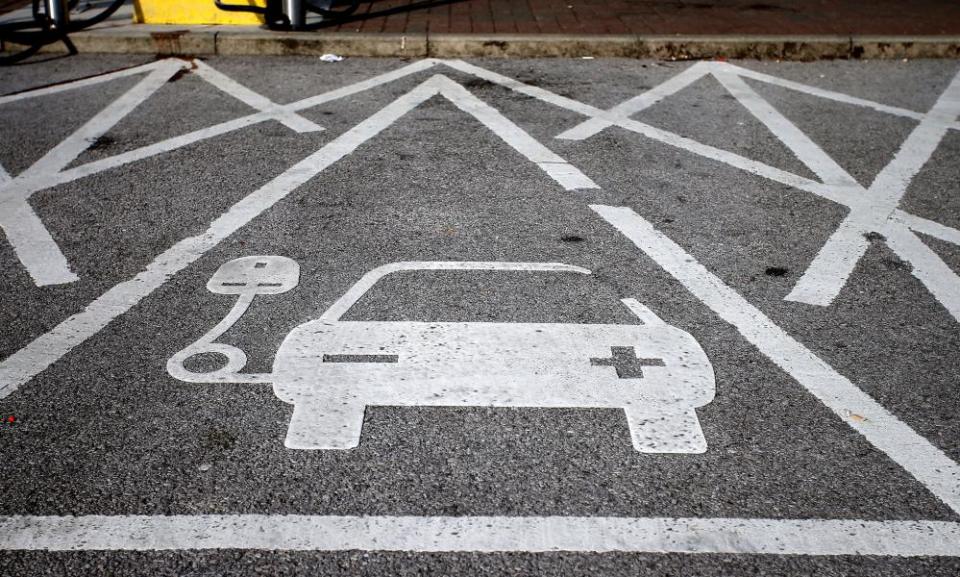Phasing out diesel and petrol cars is a woefully tiny step towards cleaner air | Caroline Lucas

Today’s air pollution announcement from the Tories is the latest in a string of green-sounding policies from a government that had previously gone quiet on the environment. Sadly, like so many of their plans, scratch beneath the surface and the green all but disappears.
The ban on new diesel and petrol cars by 2040 is a step forward, but it really is a tiny one. By then hundreds of thousands of people will have died prematurely in the UK because of air pollution, after years of delay from the government on the issue. David Powell, of the New Economic Foundation, says it’s like “telling a bullied 10-year-old that you’ll definitely have given the bully detention by the time he’s 33”. The truth is that the government is actually behind the curve, with firms like Volvo saying that all of its new motors will be electric or hybrid after 2019. But the ban wouldn’t be enough, even if it were happening sooner. The government is still woefully unambitious in its plans to clean up our filthy air and combat climate change emissions from transport.
Rather than simply looking for one headline-grabbing policy, the government should be embarking on a paradigm shift when it comes to how we get about in this country. Current spending plans will see £23bn of taxpayers’ money ploughed into the road network – thus encouraging more private car use, often at the expense of our precious countryside. Just last week ministers said they will scrap three key electrification projects on our railways. And while electric cars will have a positive effect on reducing some of the most toxic fumes in our air, they won’t solve the congestion problems afflicting many of our cities. Crucially, electric vehicles are only as clean as their power supply – and we currently face the prospect of driving cars powered by fracked gas.
Of course it’s not just cars that contribute to air pollution. Fumes from airports are deadly too – yet the government and opposition alike are apparently hell-bent on expanding Heathrow and exploring airport expansion projects elsewhere too. The residents of Newham, east London, may breathe a little easier because of the diesel and petrol ban, but the effects of an expanded bankers’ airport in the Docklands will run counter to such improvements.
To get a real sense of the transport priorities of recent governments it’s worth considering how the cost of getting around has changed. While the real price of travelling by car has plummeted by 16% since 1997, train fares are up 23%, and coaches and buses up 33%. Shockingly, the real cost of domestic flights dropped 16% between 2010 and 2015 too. Combine these price increases with busy streets where people fear walking and cycling and you can see why so many people still opt to get in their car even for short distances, and why so many people use domestic flights to get around our small country.
It’s down to the government to help people switch to cleaner, cheaper and more sustainable modes of transport. For a start that must mean an end to the continuing freeze on fuel duty – and a commitment to investing the money raised (estimated to be worth about £7bn by 2020) into public transport, walking and cycling. We should also investigate how a diesel scrappage scheme could hand people public transport vouchers, rather than always offering like-for-like replacement (though of course for some people that will be needed too).
Other countries are leading the way. In Amsterdam and the Hague up to 70% of journeys are by bike. In Bogotá a bus-first public transport system has been a huge success. Trains are cheaper across Europe than they are here.
Ultimately we need a green transport revolution, not another tinker with a transport system that’s creaking. Let’s aim for towns and cities that are easily navigable by foot and bike, a fully electric and publicly owned train system that covers the country, and local public transport that’s a joy to use – rather than the overpriced, unreliable service that’s currently on offer in so many places.
Building a transport system fit for the future won’t just save lives that are cut short by air pollution, it will change the way we live for the better. Well-designed transport means strong local communities, safer streets for our children to play in and quicker commutes that free up time for us to do the things we love. A diesel ban is a small part of designing such a system. It’s now time to put the rest of the jigsaw pieces in place.

 Yahoo News
Yahoo News 